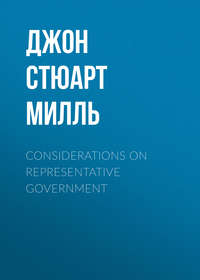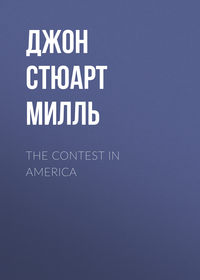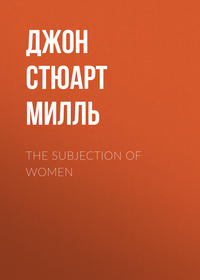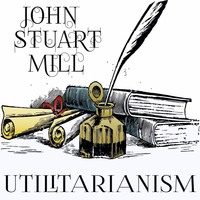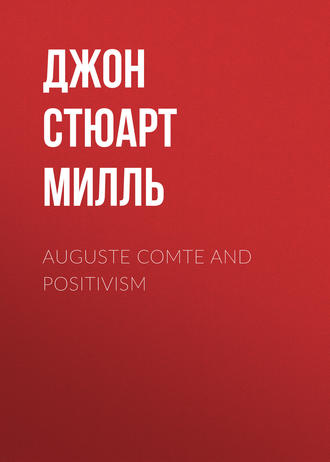 полная версия
полная версияAuguste Comte and Positivism
This hiatus in M. Comte's system is not unconnected with a defect in his original conception of the subject matter of scientific investigation, which has been generally noticed, for it lies on the surface, and is more apt to be exaggerated than overlooked. It is often said of him that he rejects the study of causes. This is not, in the correct acceptation, true, for it is only questions of ultimate origin, and of Efficient as distinguished from what are called Physical causes, that he rejects. The causes that he regards as inaccessible are causes which are not themselves phaenomena. Like other people he admits the study of causes, in every sense in which one physical fact can be the cause of another. But he has an objection to the word cause; he will only consent to speak of Laws of Succession: and depriving himself of the use of a word which has a Positive meaning, he misses the meaning it expresses. He sees no difference between such generalizations as Kepler's laws, and such as the theory of gravitation. He fails to perceive the real distinction between the laws of succession and coexistence which thinkers of a different school call Laws of Phaenomena, and those of what they call the action of Causes: the former exemplified by the succession of day and night, the latter by the earth's rotation which causes it. The succession of day and night is as much an invariable sequence, as the alternate exposure of opposite sides of the earth to the sun. Yet day and night are not the causes of one another; why? Because their sequence, though invariable in our experience, is not unconditionally so: those facts only succeed each other, provided that the presence and absence of the sun succeed each other, and if this alternation were to cease, we might have either day or night unfollowed by one another. There are thus two kinds of uniformities of succession, the one unconditional, the other conditional on the first: laws of causation, and other successions dependent on those laws. All ultimate laws are laws of causation, and the only universal law beyond the pale of mathematics is the law of universal causation, namely, that every phaenomenon has a phaenomenal cause; has some phaenomenon other than itself, or some combination of phaenomena, on which it is invariably and unconditionally consequent. It is on the universality of this law that the possibility rests of establishing a canon of Induction. A general proposition inductively obtained is only then proved to be true, when the instances on which it rests are such that if they have been correctly observed, the falsity of the generalization would be inconsistent with the constancy of causation; with the universality of the fact that the phaenomena of nature take place according to invariable laws of succession.9 It is probable, therefore, that M. Comte's determined abstinence from the word and the idea of Cause, had much to do with his inability to conceive an Inductive Logic, by diverting his attention from the only basis upon which it could be founded.
We are afraid it must also be said, though shown only by slight indications in his fundamental work, and coming out in full evidence only in his later writings – that M. Comte, at bottom, was not so solicitous about completeness of proof as becomes a positive philosopher, and that the unimpeachable objectivity, as he would have called it, of a conception – its exact correspondence to the realities of outward fact – was not, with him, an indispensable condition of adopting it, if it was subjectively useful, by affording facilities to the mind for grouping phaenomena. This appears very curiously in his chapters on the philosophy of Chemistry. He recommends, as a judicious use of "the degree of liberty left to our intelligence by the end and purpose of positive science," that we should accept as a convenient generalization the doctrine that all chemical composition is between two elements only; that every substance which our analysis decomposes, let us say into four elements, has for its immediate constituents two hypothetical substances, each compounded of two simpler ones. There would have been nothing to object to in this as a scientific hypothesis, assumed tentatively as a means of suggesting experiments by which its truth may be tested. With this for its destination, the conception, would have been legitimate and philosophical; the more so, as, if confirmed, it would have afforded an explanation of the fact that some substances which analysis shows to be composed of the same elementary substances in the same proportions, differ in their general properties, as for instance, sugar and gum.10 And if, besides affording a reason for difference between things which differ, the hypothesis had afforded a reason for agreement between things which agree; if the intermediate link by which the quaternary compound was resolved into two binary ones, could have been so chosen as to bring each of them within the analogies of some known class of binary compounds (which it is easy to suppose possible, and which in some particular instances actually happens);11 the universality of binary composition would have been a successful example of an hypothesis in anticipation of a positive theory, to give a direction to inquiry which might end in its being either proved or abandoned. But M. Comte evidently thought that even though it should never be proved – however many cases of chemical composition might always remain in which the theory was still as hypothetical as at first – so long as it was not actually disproved (which it is scarcely in the nature of the case that it should ever be) it would deserve to be retained, for its mere convenience in bringing a large body of phaenomena under a general conception. In a résumé of the general principles of the positive method at the end of the work, he claims, in express terms, an unlimited license of adopting "without any vain scruple" hypothetical conceptions of this sort; "in order to satisfy, within proper limits, our just mental inclinations, which always turn, with an instinctive predilection, towards simplicity, continuity, and generality of conceptions, while always respecting the reality of external laws in so far as accessible to us" (vi. 639). "The most philosophic point of view leads us to conceive the study of natural laws as destined to represent the external world so as to give as much satisfaction to the essential inclinations of our intelligence, as is consistent with the degree of exactitude commanded by the aggregate of our practical wants" (vi. 642). Among these "essential inclinations" he includes not only our "instinctive predilection for order and harmony," which makes us relish any conception, even fictitious, that helps to reduce phaenomena to system; but even our feelings of taste, "les convenances purement esthétiques," which, he says, have a legitimate part in the employment of the "genre de liberté" resté facultatif pour notre intelligence." After the due satisfaction of our "most eminent mental inclinations," there will still remain "a considerable margin of indeterminateness, which should be made use of to give a direct gratification to our besoin of ideality, by embellishing our scientific thoughts, without injury to their essential reality" (vi. 647). In consistency with all this, M. Comte warns thinkers against too severe a scrutiny of the exact truth of scientific laws, and stamps with "severe reprobation" those who break down "by too minute an investigation" generalizations already made, without being able to substitute others (vi. 639): as in the case of Lavoisier's general theory of chemistry, which would have made that science more satisfactory than at present to "the instinctive inclinations of our intelligence" if it had turned out true, but unhappily it did not. These mental dispositions in M. Comte account for his not having found or sought a logical criterion of proof; but they are scarcely consistent with his inveterate hostility to the hypothesis of the luminiferous ether, which certainly gratifies our "predilection for order and harmony," not to say our "besoin d'idéalite", in no ordinary degree. This notion of the "destination" of the study of natural laws is to our minds a complete dereliction of the essential principles which form the Positive conception of science; and contained the germ of the perversion of his own philosophy which marked his later years. It might be interesting, but scarcely worth while, to attempt to penetrate to the just thought which misled M. Comte, for there is almost always a grain of truth in the errors of an original and powerful mind. There is another grave aberration in M. Comte's view of the method of positive science, which though not more unphilosophical than the last mentioned, is of greater practical importance. He rejects totally, as an invalid process, psychological observation properly so called, or in other words, internal consciousness, at least as regards our intellectual operations. He gives no place in his series of the science of Psychology, and always speaks of it with contempt. The study of mental phaenomena, or, as he expresses it, of moral and intellectual functions, has a place in his scheme, under the head of Biology, but only as a branch of physiology. Our knowledge of the human mind must, he thinks, be acquired by observing other people. How we are to observe other people's mental operations, or how interpret the signs of them without having learnt what the signs mean by knowledge of ourselves, he does not state. But it is clear to him that we can learn very little about the feelings, and nothing at all about the intellect, by self-observation. Our intelligence can observe all other things, but not itself: we cannot observe ourselves observing, or observe ourselves reasoning: and if we could, attention to this reflex operation would annihilate its object, by stopping the process observed.
There is little need for an elaborate refutation of a fallacy respecting which the only wonder is that it should impose on any one. Two answers may be given to it. In the first place, M. Comte might be referred to experience, and to the writings of his countryman M. Cardaillac and our own Sir William Hamilton, for proof that the mind can not only be conscious of, but attend to, more than one, and even a considerable number, of impressions at once.12 It is true that attention is weakened by being divided; and this forms a special difficulty in psychological observation, as psychologists (Sir William Hamilton in particular) have fully recognised; but a difficulty is not an impossibility. Secondly, it might have occurred to M. Comte that a fact may be studied through the medium of memory, not at the very moment of our perceiving it, but the moment after: and this is really the mode in which our best knowledge of our intellectual acts is generally acquired. We reflect on what we have been doing, when the act is past, but when its impression in the memory is still fresh. Unless in one of these ways, we could not have acquired the knowledge, which nobody denies us to have, of what passes in our minds. M. Comte would scarcely have affirmed that we are not aware of our own intellectual operations. We know of our observings and our reasonings, either at the very time, or by memory the moment after; in either case, by direct knowledge, and not (like things done by us in a state of somnambulism) merely by their results. This simple fact destroys the whole of M. Comte's argument. Whatever we are directly aware of, we can directly observe.
And what Organon for the study of "the moral and intellectual functions" does M. Comte offer, in lieu of the direct mental observation which he repudiates? We are almost ashamed to say, that it is Phrenology! Not, indeed, he says, as a science formed, but as one still to be created; for he rejects almost all the special organs imagined by phrenologists, and accepts only their general division of the brain into the three regions of the propensities, the sentiments, and the intellect,13 and the subdivision of the latter region between the organs of meditation and those of observation. Yet this mere first outline of an apportionment of the mental functions among different organs, he regards as extricating the mental study of man from the metaphysical stage, and elevating it to the positive. The condition of mental science would be sad indeed if this were its best chance of being positive; for the later course of physiological observation and speculation has not tended to confirm, but to discredit, the phrenological hypothesis. And even if that hypothesis were true, psychological observation would still be necessary; for how is it possible to ascertain the correspondence between two things, by observation of only one of them? To establish a relation between mental functions and cerebral conformations, requires not only a parallel system of observations applied to each, but (as M. Comte himself, with some inconsistency, acknowledges) an analysis of the mental faculties, "des diverses facultés élémentaires," (iii. 573), conducted without any reference to the physical conditions, since the proof of the theory would lie in the correspondence between the division of the brain into organs and that of the mind into faculties, each shown by separate evidence. To accomplish this analysis requires direct psychological study carried to a high pitch of perfection; it being necessary, among other things, to investigate the degree in which mental character is created by circumstances, since no one supposes that cerebral conformation does all, and circumstances nothing. The phrenological study of Mind thus supposes as its necessary preparation the whole of the Association psychology. Without, then, rejecting any aid which study of the brain and nerves can afford to psychology (and it has afforded, and will yet afford, much), we may affirm that M. Comte has done nothing for the constitution of the positive method of mental science. He refused to profit by the very valuable commencements made by his predecessors, especially by Hartley, Brown, and James Mill (if indeed any of those philosophers were known to him), and left the psychological branch of the positive method, as well as psychology itself, to be put in their true position as a part of Positive Philosophy by successors who duly placed themselves at the twofold point of view of physiology and psychology, Mr Bain and Mr Herbert Spencer. This great mistake is not a mere hiatus in M. Comte's system, but the parent of serious errors in his attempt to create a Social Science. He is indeed very skilful in estimating the effect of circumstances in moulding the general character of the human race; were he not, his historical theory could be of little worth: but in appreciating the influence which circumstances exercise, through psychological laws, in producing diversities of character, collective or individual, he is sadly at fault.
After this summary view of M. Comte's conception of Positive Philosophy, it remains to give some account of his more special and equally ambitious attempt to create the Science of Sociology, or, as he expresses it, to elevate the study of social phaenomena to the positive state.
He regarded all who profess any political opinions as hitherto divided between the adherents of the theological and those of the metaphysical mode of thought: the former deducing all their doctrines from divine ordinances, the latter from abstractions. This assertion, however, cannot be intended in the same sense as when the terms are applied to the sciences of inorganic nature; for it is impossible that acts evidently proceeding from the human will could be ascribed to the agency (at least immediate) of either divinities or abstractions. No one ever regarded himself or his fellow-man as a mere piece of machinery worked by a god, or as the abode of an entity which was the true author of what the man himself appeared to do. True, it was believed that the gods, or God, could move or change human wills, as well as control their consequences, and prayers were offered to them accordingly, rather as able to overrule the spontaneous course of things, than as at each instant carrying it on. On the whole, however, the theological and metaphysical conceptions, in their application to sociology, had reference not to the production of phaenomena, but to the rule of duty, and conduct in life. It is this which was based, either on a divine will, or on abstract mental conceptions, which, by an illusion of the rational faculty, were invested with objective validity. On the one hand, the established rules of morality were everywhere referred to a divine origin. In the majority of countries the entire civil and criminal law was looked upon as revealed from above; and it is to the petty military communities which escaped this delusion, that man is indebted for being now a progressive being. The fundamental institutions of the state were almost everywhere believed to have been divinely established, and to be still, in a greater or less degree, of divine authority. The divine right of certain lines of kings to rule, and even to rule absolutely, was but lately the creed of the dominant party in most countries of Europe; while the divine right of popes and bishops to dictate men's beliefs (and not respecting the invisible world alone) is still striving, though under considerable difficulties, to rule mankind. When these opinions began to be out of date, a rival theory presented itself to take their place. There were, in truth, many such theories, and to some of them the term metaphysical, in M. Comte's sense, cannot justly be applied. All theories in which the ultimate standard of institutions and rules of action was the happiness of mankind, and observation and experience the guides (and some such there have been in all periods of free speculation), are entitled to the name Positive, whatever, in other respects, their imperfections may be. But these were a small minority. M. Comte was right in affirming that the prevailing schools of moral and political speculation, when not theological, have been metaphysical. They affirmed that moral rules, and even political institutions, were not means to an end, the general good, but corollaries evolved from the conception of Natural Rights. This was especially the case in all the countries in which the ideas of publicists were the offspring of the Roman Law. The legislators of opinion on these subjects, when not theologians, were lawyers: and the Continental lawyers followed the Roman jurists, who followed the Greek metaphysicians, in acknowledging as the ultimate source of right and wrong in morals, and consequently in institutions, the imaginary law of the imaginary being Nature. The first systematizers of morals in Christian Europe, on any other than a purely theological basis, the writers on International Law, reasoned wholly from these premises, and transmitted them to a long line of successors. This mode of thought reached its culmination in Rousseau, in whose hands it became as powerful an instrument for destroying the past, as it was impotent for directing the future. The complete victory which this philosophy gained, in speculation, over the old doctrines, was temporarily followed by an equally complete practical triumph, the French Revolution: when, having had, for the first time, a full opportunity of developing its tendencies, and showing what it could not do, it failed so conspicuously as to determine a partial reaction to the doctrines of feudalism and Catholicism. Between these and the political metaphysics (meta-politics as Coleridge called it) of the Revolution, society has since oscillated; raising up in the process a hybrid intermediate party, termed Conservative, or the party of Order, which has no doctrines of its own, but attempts to hold the scales even between the two others, borrowing alternately the arguments of each, to use as weapons against whichever of the two seems at the moment most likely to prevail.
Such, reduced to a very condensed form, is M. Comte's version of the state of European opinion on politics and society. An Englishman's criticism would be, that it describes well enough the general division of political opinion in France and the countries which follow her lead, but not in England, or the communities of English origin: in all of which, divine right died out with the Jacobites, and the law of nature and natural rights have never been favourites even with the extreme popular party, who preferred to rest their claims on the historical traditions of their own country, and on maxims drawn from its law books, and since they outgrew this standard, almost always base them on general expediency. In England, the preference of one form of government to another seldom turns on anything but the practical consequences which it produces, or which are expected from it. M. Comte can point to little of the nature of metaphysics in English politics, except "la métaphysique constitutionnelle," a name he chooses to give to the conventional fiction by which the occupant of the throne is supposed to be the source from whence all power emanates, while nothing can be further from the belief or intention of anybody than that such should really be the case. Apart from this, which is a matter of forms and words, and has no connexion with any belief except belief in the proprieties, the severest criticism can find nothing either worse or better, in the modes of thinking either of our conservative or of our liberal party, than a particularly shallow and flimsy kind of positivism. The working classes indeed, or some portion of them, perhaps still rest their claim to universal suffrage on abstract right, in addition to more substantial reasons, and thus far and no farther does metaphysics prevail in the region of English politics. But politics is not the entire art of social existence: ethics is a still deeper and more vital part of it: and in that, as much in England as elsewhere, the current opinions are still divided between the theological mode of thought and the metaphysical. What is the whole doctrine of Intuitive Morality, which reigns supreme wherever the idolatry of Scripture texts has abated and the influence of Bentham's philosophy has not reached, but the metaphysical state of ethical science? What else, indeed, is the whole a priori philosophy, in morals, jurisprudence, psychology, logic, even physical science, for it does not always keep its hands off that, the oldest domain of observation and experiment? It has the universal diagnostic of the metaphysical mode of thought, in the Comtean sense of the word; that of erecting a mere creation of the mind into a test or norma of external truth, and presenting the abstract expression of the beliefs already entertained, as the reason and evidence which justifies them. Of those who still adhere to the old opinions we need not speak; but when one of the most vigorous as well as boldest thinkers that English speculation has yet produced, full of the true scientific spirit, Mr Herbert Spencer, places in the front of his philosophy the doctrine that the ultimate test of the truth of a proposition is the inconceivableness of its negative; when, following in the steps of Mr Spencer, an able expounder of positive philosophy like Mr Lewes, in his meritorious and by no means superficial work on Aristotle, after laying, very justly, the blame of almost every error of the ancient thinkers on their neglecting to verify their opinions, announces that there are two kinds of verification, the Real and the Ideal, the ideal test of truth being that its negative is unthinkable, and by the application of that test judges that gravitation must be universal even in the stellar regions, because in the absence of proof to the contrary, "the idea of matter without gravity is unthinkable;" – when those from whom it was least to be expected thus set up acquired necessities of thought in the minds of one or two generations as evidence of real necessities in the universe, we must admit that the metaphysical mode of thought still rules the higher philosophy, even in the department of inorganic nature, and far more in all that relates to man as a moral, intellectual, and social being.
But, while M. Comte is so far in the right, we often, as already intimated, find him using the name metaphysical to denote certain practical conclusions, instead of a particular kind of theoretical premises. Whatever goes by the different names of the revolutionary, the radical, the democratic, the liberal, the free-thinking, the sceptical, or the negative and critical school or party in religion, politics, or philosophy, all passes with him under the designation of metaphysical, and whatever he has to say about it forms part of his description of the metaphysical school of social science. He passes in review, one after another, what he deems the leading doctrines of the revolutionary school of politics, and dismisses them all as mere instruments of attack upon the old social system, with no permanent validity as social truth.



